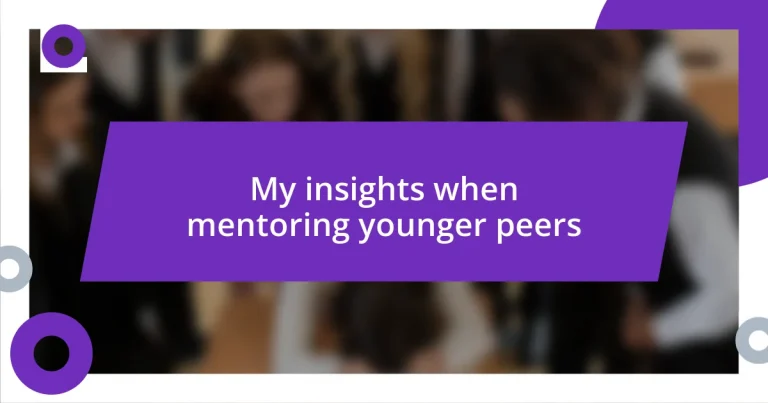Key takeaways:
- Empathy and active listening are crucial for building a strong mentor-mentee relationship, facilitating open communication and trust.
- Setting SMART goals transforms aspirations into actionable plans, significantly boosting motivation and self-esteem through celebrating small wins.
- Encouraging independence in mentees fosters their confidence and critical thinking, allowing them to grow through self-discovery and decision-making.
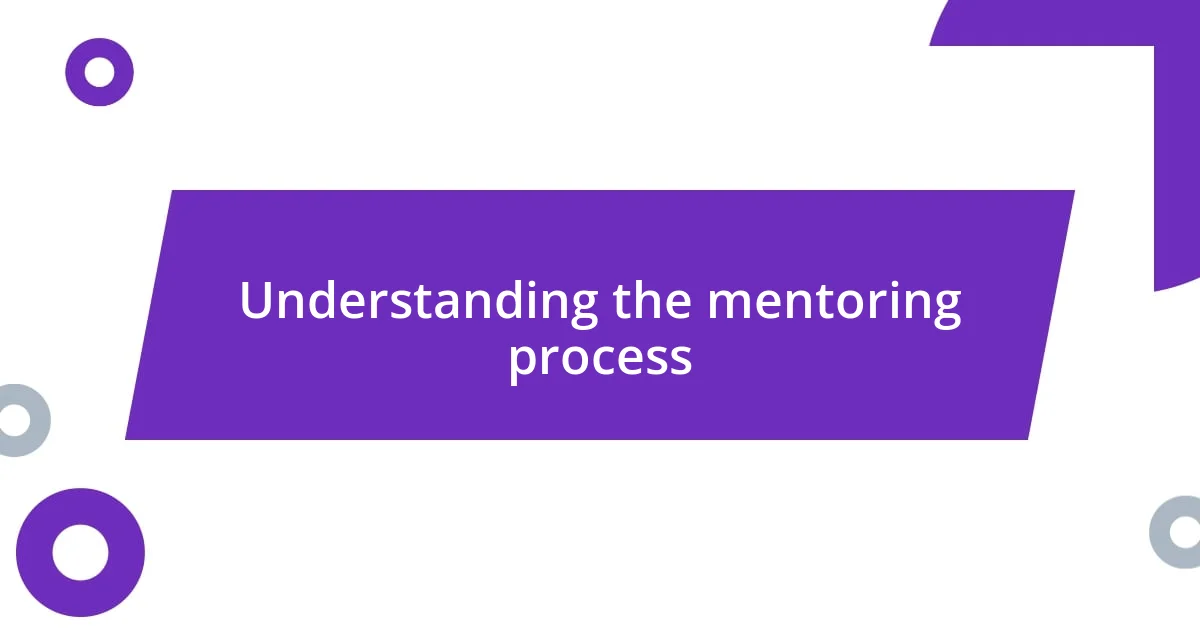
Understanding the mentoring process
When I think about the mentoring process, it truly feels like a journey we embark on together. Every interaction is a chance for growth—not just for the mentee, but for me as well. Have you ever found yourself learning something unexpected while guiding someone else? I certainly have, and it’s like peeling back the layers of an onion; each layer reveals new insights that deepen our understanding.
Understanding the mentoring process also demands a significant degree of empathy. I remember once working with a younger colleague who felt overwhelmed by their workload. Instead of simply advising them to manage their time better, I asked questions to uncover what was really bothering them. This approach not only helped me tailor my advice to their unique situation but also built trust in our relationship, illuminating the importance of emotional support in mentoring.
Moreover, the mentoring process is inherently dynamic; it evolves with the needs of both parties. I often reflect on how my role shifts from instructor to collaborator as our relationship deepens. I ask myself, how can I adapt to be most effective? Being flexible in my approach has led to richer conversations and, ultimately, stronger outcomes for my mentees.
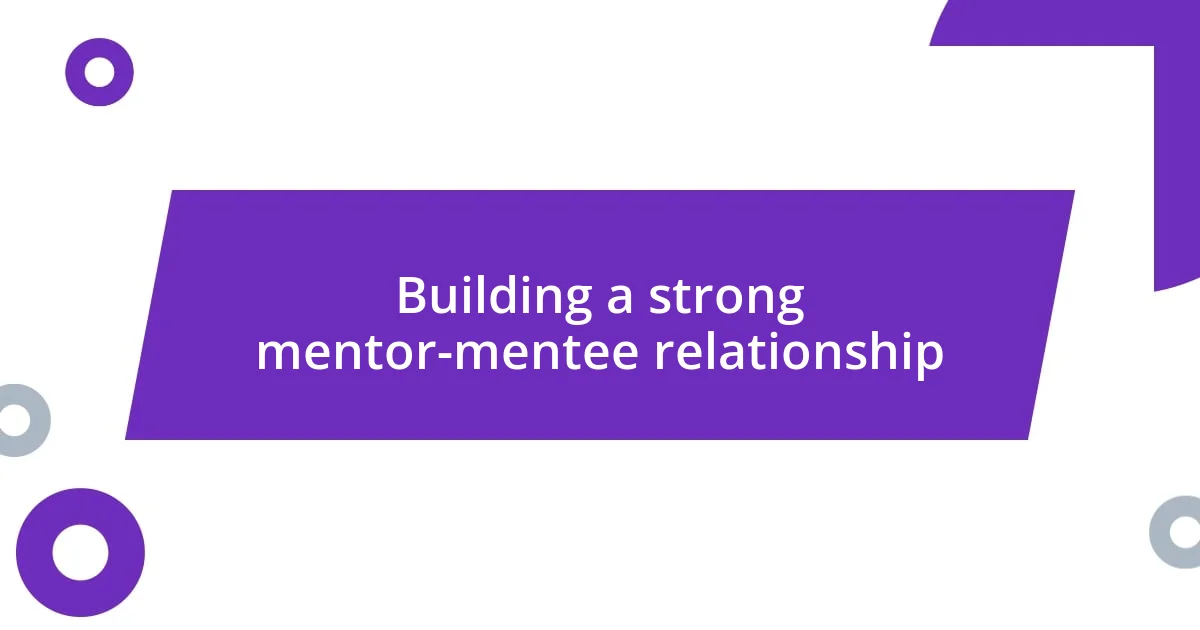
Building a strong mentor-mentee relationship
Building a strong mentor-mentee relationship hinges on mutual respect and open communication. I’ve found that when my mentees feel comfortable sharing their thoughts and feelings, it fosters a deeper connection. I once had a mentee who was hesitant to voice their ideas, fearing they weren’t good enough. By encouraging them to speak freely and validating their thoughts, we built a pivotal trust that transformed our interactions. It’s in those moments of vulnerability that real learning occurs.
To strengthen this bond further, consider these strategies:
- Active Listening: Make a conscious effort to listen without interrupting, showing that you value their perspective.
- Regular Check-ins: Schedule consistent meetings to discuss progress, challenges, and personal development.
- Set Mutual Goals: Collaborate on goals that resonate with both of you, which can create a sense of shared purpose.
- Offer Authentic Feedback: Provide constructive criticism in a supportive manner, focusing on growth rather than shortcomings.
- Celebrate Achievements: Acknowledge milestones, no matter how small, to reinforce positivity and motivation.
Integrating these approaches not only enhances the learning experience but also cultivates a lasting relationship that extends beyond the mentoring period.
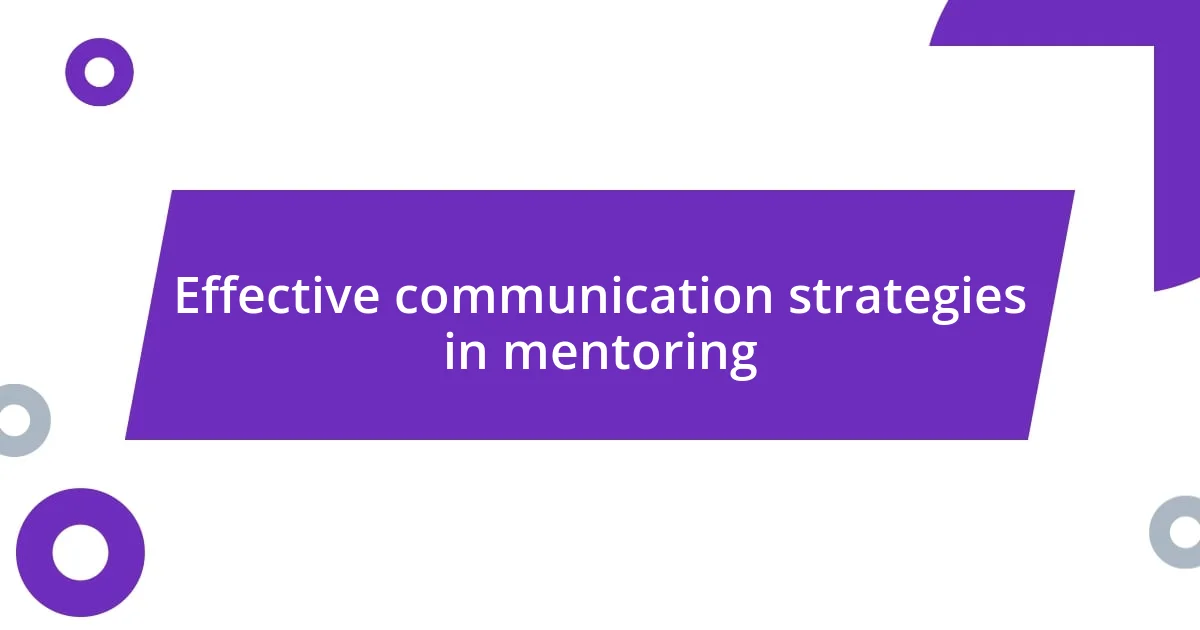
Effective communication strategies in mentoring
Effective communication is a cornerstone of successful mentoring. I remember a time when I was mentoring a young professional who was struggling with a particular project. Instead of just telling them what to do, I opted for a dialogue approach. I asked open-ended questions that encouraged them to share their thoughts, which not only clarified their concerns but also empowered them to find their own solutions. This back-and-forth exchange helped build their confidence, demonstrating how vital authentic conversation can be in mentoring relationships.
Another strategy I found effective is incorporating storytelling into our discussions. Sharing relevant experiences from my own career not only makes the advice relatable but also opens up pathways for deeper conversation. One memorable instance was when I recounted a challenging project I faced early in my career. This sparked a lively discussion about resilience and adaptability, creating a space for my mentee to reflect on their own challenges. Engaging through storytelling fosters connection and understanding, making our communications feel more personal and impactful.
Finally, clarity in communication cannot be overlooked. I have often found myself stepping back to ensure my messages are understood, especially when discussing complex topics. I once took a whole session to break down a complicated concept into simpler terms, using analogies and visual aids. This attention to clarity ensured that the mentee didn’t just hear me but truly understood. By valuing clarity, we honor the mentee’s learning journey and pave the way for effective collaboration.
| Communication Strategy | Description |
|---|---|
| Active Listening | Focusing entirely on the mentee’s words, showing you value their perspective. |
| Storytelling | Using personal experiences to relate to challenges and lessons. |
| Clarity | Ensuring that complex ideas are simplified and understood. |
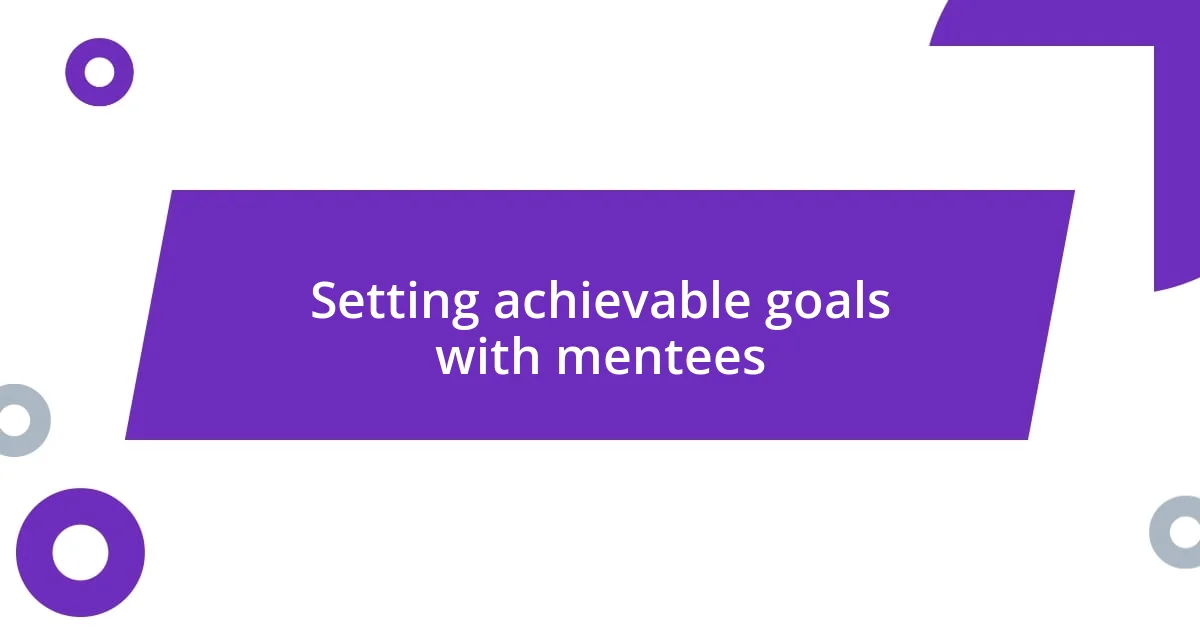
Setting achievable goals with mentees
Setting achievable goals with mentees is a powerful way to ensure their growth and confidence. During one of my mentoring experiences, we started by discussing what my mentee truly wanted to achieve. It wasn’t until we broke down their ambitious vision into smaller, tangible steps that they felt a weight lift off their shoulders. I often wonder how many people overlook this crucial step—are they setting goals that feel more like obstacles instead of stepping stones?
When I guide my mentees in goal-setting, I focus on the idea of SMART goals—Specific, Measurable, Achievable, Relevant, and Time-bound. I vividly recall a mentee who initially wanted to increase her sales performance by 50% in just three months. After a thoughtful conversation, we adjusted her goal to a 10% increase over those three months, which felt more attainable. It was incredible to witness her determination as she moved forward with a clearer, more manageable target. This experience reinforced my belief in the importance of realistic goal-setting; it transforms aspirations into actionable plans.
I’ve found that celebrating small wins along the way can significantly boost motivation and self-esteem. For instance, after my mentee reached her first milestone, we took a moment to acknowledge her progress with a light-hearted lunch. Reflecting on those achievements not only reinforced her sense of accomplishment but also strengthened our mentoring relationship. Whatever the challenge, a supportive and intentional approach to goal-setting can make a world of difference—after all, don’t we all thrive on a little recognition?
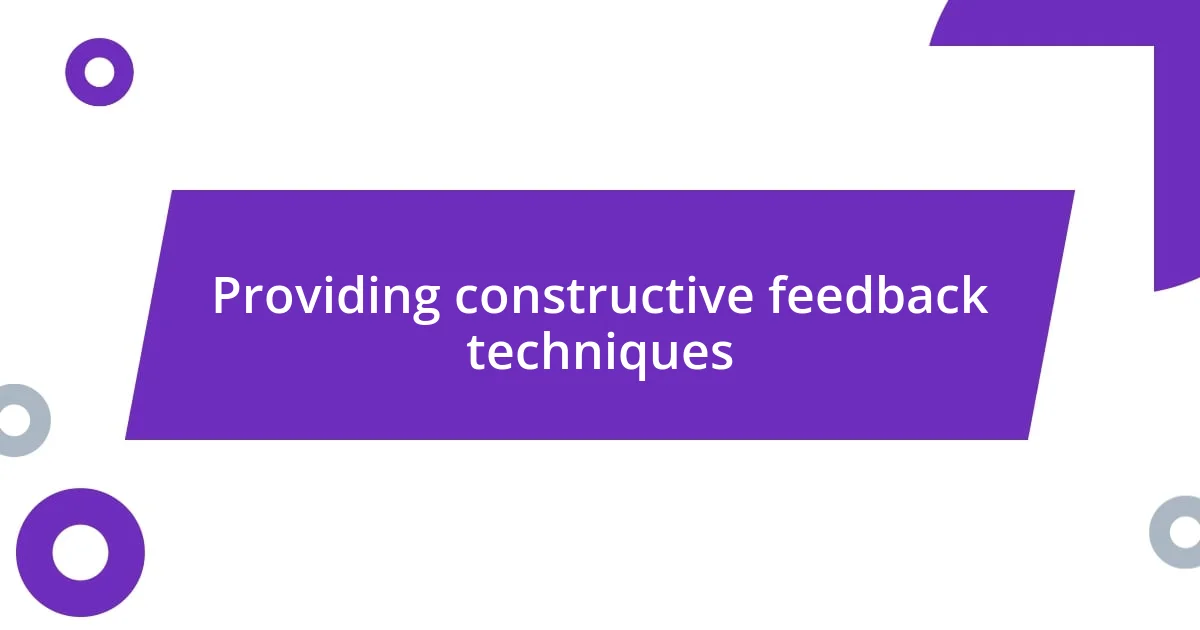
Providing constructive feedback techniques
Providing constructive feedback is an art that blends honesty with empathy. When I navigate this process, I often start by identifying the strengths of my mentee before touching on areas needing improvement. I remember sitting down with one mentee who was deeply passionate but occasionally overlooked crucial details. By first highlighting their creativity and dedication, I gently steered the conversation toward missed opportunities, asking, “How do you think those details could elevate your wonderful ideas?” This shift in perspective opened their eyes without discouraging them.
Another technique I find invaluable involves framing feedback as an opportunity for growth rather than as criticism. Once, I reviewed a report my mentee had put together, and instead of expressing disappointment over errors, I highlighted the concepts that resonated well. I shared, “This section is so engaging! Imagine if we could refine these parts—what do you envision could enhance its impact?” Questions like these not only guide them to think critically but also preserve their motivation. I’ve seen firsthand how this method cultivates a positive mindset, making feedback feel like a collaborative journey.
Lastly, I emphasize the importance of timing and environment in delivering feedback. Finding a comfortable and safe space can transform how the message is received. There was a time when I delivered constructive feedback during a casual coffee break. The relaxed atmosphere shifted the weight of the conversation, allowing my mentee to absorb the insights without feeling defensive. I often ask myself—what’s the ideal setting for this dialogue? Recognizing the right moment can amplify the effectiveness of my feedback, creating a more receptive and harmonious interaction.
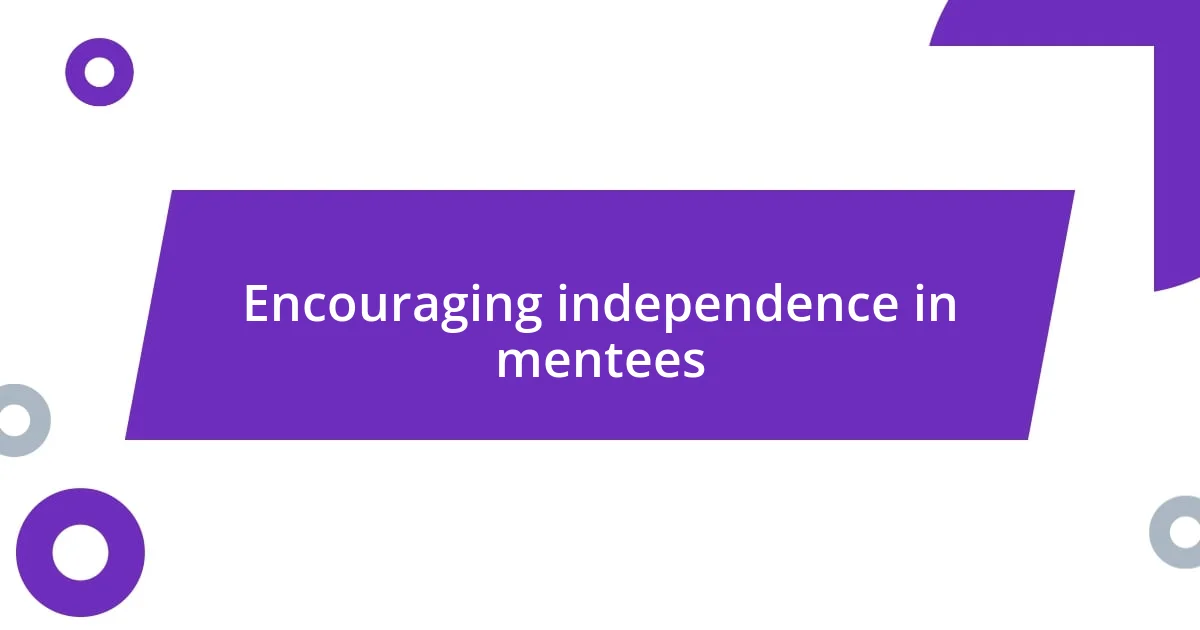
Encouraging independence in mentees
Encouraging independence in my mentees is one of the most rewarding aspects of mentoring. I vividly recall a time when I encouraged a mentee to tackle a project entirely on her own. I remember standing back to let her take charge, and while I felt a mix of excitement and anxiety, I also had faith in her abilities. Watching her grow through that experience made me realize that independence isn’t just about letting go; it’s about nurturing their confidence to take the reins.
I’ve found that promoting problem-solving is an essential part of this journey. Rather than automatically providing answers, I often ask guiding questions like, “What do you think would happen if you tried this approach?” This encourages my mentees to think critically and explore various paths on their own. Just recently, one mentee faced a tough decision about her career path. By reframing our conversation to focus on her values and ambitions, she was able to connect the dots herself. It was gratifying to see her light up with realization—that independence is as much about self-discovery as it is about decision-making.
A pivotal moment for me was when I decided to empower a mentee to make a significant presentation without my help. The weight of responsibility rested heavily on her shoulders—how would she handle it? To my delight, she not only delivered confidently but also received rave reviews. This experience solidified my belief that embracing independence fosters growth. When I reflect on moments like this, I can’t help but wonder how many times we unintentionally stifle potential by stepping in too quickly. In mentoring, giving space often leads to incredible outcomes.












